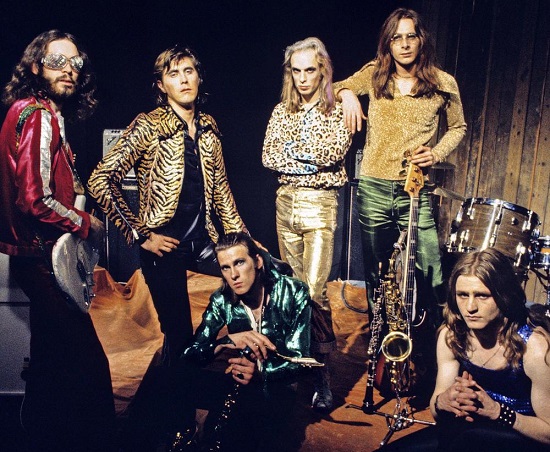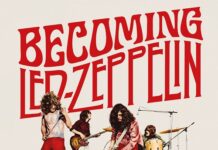By Ira Kantor
I’ll admit, when I heard Roxy Music made the shortlist for potential induction into the Rock and Roll Hall of Fame, I had instant excitement about them actually being considered. At the same time, I had virtually no confidence in their making it in on the first try, if at all.
Fortunately, the proverbial powers that be proved me wrong. They saw past a strong commercialism standard and mainly focused on the group’s artistic integrity and influence instead.
Given that Roxy is one of the most innovative bands of all time — due in large part to the style and sophisticated talents of its members — it’s only right a group of this caliber will be enshrined along with its contemporaries and even those they’ve influenced. It doesn’t matter in the slightest that only one of their eight albums (their last) struck platinum in the U.S. They’ve only gotten better with age.
Yet while we’ve overcome one key hurdle — Roxy’s induction — it’s still yet to be determined if its members will A, collectively show up to collect their trophies, and B, actually perform together. While I truly believe the sum of Roxy is more valuable than its individual parts, it just won’t be the same if Paul Thompson, Andy Mackay, Phil Manzanera, Brian Eno and Bryan Ferry don’t make the trek to Cleveland.
It may be inevitable though that this is the case. Roxy always played by its own rules. Band members dressed to startle and encourage stares; tinkered with sounds to defy genre conventions; wrote tracks that stretched the parameters of accessibility; and openly flaunted T&A on a majority of its album covers. I don’t know many groups who can get away with penning a startling ode to a blow-up doll (“In Every Dream Home A Heartache”) to a coldly cool anthem like “More Than This.” Brian Eno only lasted two albums with the group — among its two best — but made enough of an impact that it set him up as a musical innovator for life. Bryan Ferry’s distinctive croon is unsurpassed and inviting, yet the suaveness of his on-record/on-stage demeanor seemingly masks a man of deep privacy.
For the past year, Roxy has been my band of choice. Along with keeping their albums on heavy rotation, I’ve been working to turn those around me onto them (with steadily growing success). Yet I feel almost ashamed in getting into this group too late in life. So even though time will tell if the group will reunite for at least one night only in 2019, let’s take the opportunity revisit a dozen classic Roxy songs spanning its 10-year proactive period that define the group as both a terrific band of our time and still ahead of its time.
***
“Virginia Plain” (1972) from Roxy Music
Here is three minutes of throbbing keyboard, high oboe and soundscape perfection as Ferry cuts right to the chase: “Make me a deal and make it straight.” Combining glam cockiness with ballsy guitar and futuristic sounds, Roxy make themselves heard loud and clear as Ferry jumps from cheeky to serious as a heart attack in mere seconds. Then with what will become trademark defiance, they end things on their own terms – immediately after the words “Virginia Plain” are spoken. It’s music’s equivalent to the finale of The Sopranos.
***
“If There Is Something” (1972) from Roxy Music
Here we’re initially misled into thinking Roxy has country roots as Manzanera’s twangy guitar and Ferry’s hangdog vocals seem to encapsulate all the genre’s necessities for greatness. Then things take a somewhat eerie yet completely enveloping turn as Mackay turns his sax on full blast and drummer Paul Thompson provides a hard-driving beat that complements one of Ferry’s most guttural vocals ever captured on record. By the time he sings, “I would do anything for you; I would climb mountains,” there’s no denying you’re hooked and you’re only a third of the way through the track. Think of this track as a three-piece movement with Mackay taking charge by its close – making horns cool and exciting within a genre where virtuosity isn’t a requirement.
***
“2HB” (1972) from Roxy Music
Building up in intensity, Ferry sings about his unabashed love for Humphrey Bogart. “Here’s looking at you, kid” seems a cliché to incorporate as a chorus line, but hearing Ferry sing it is a sign of how his image and style would work wonders in tandem with the group’s overall musical chops.
***
“Do The Strand” (1973) from For Your Pleasure
Roxy Music didn’t create many dance songs during its existence, but here they’ve crafted the perfect song encapsulating – as Ferry describes it — “teenage revolution.” This track opens the group’s greatest album For Your Pleasure and truly packs a wallop as every musician turns it up to 11 to create something both raucous and highly catchy at the same time. “Weary of the waltz and Mashed Potato schmaltz,” cries Ferry — thus casting off traditions of yore for something completely different.
***
“Editions Of You” (1973) from For Your Pleasure
Even if it’s “too much cheesecake too soon” for the artsy quintet, they’re hitting all the right buttons and making all the right sounds as Ferry sheds any inhibitions. The result is a melodic precursor to the kind of noise that gives birth to punk rock. This is also Eno’s penultimate track as he manipulates siren-esque sound in ways that sound both free-jazz and orgasmic. Manzanera is right behind pushing out intense chords as the group gets in on the fun and seems to have a blast blasting out their musical guts.
***
“The Bogus Man” (1973) from For Your Pleasure
One of the most devilish songs in the Roxy arsenal, it’s also one of the band’s catchiest, thanks to a fantastic bass groove courtesy of John Porter, a steady drum beat, Mackay’s smoky saxophone and Ferry’s high-pitched sinister vocals. A true opus at more than nine minutes long, the track never loses its intensity and by the time Ferry offers his “chk” background vocals to play up the stalkerish tendencies of the song’s title character, you’re waiting with baited breath to see how the track will end. Though not as scary as say Suicide’s “Frankie Teardrop,” the track still manages to project a perfect balance of seduction and terror.
***
“Street Life” (1973) from Stranded
Even shrouded in dissonance, Roxy is in top form here, kicking off their third album with another strong opener. Visual in both its lyrics and Ferry’s gritty vocal delivery, the song proves the band can sustain without Eno’s sound manipulations and craft the kind of gems that establish the rock band as true originators. Consider this as the original “Love Is The Drug” before “Love Is The Drug” arrives two years later.
***
“The Thrill Of It All” (1974) from Country Life
This song builds with an instrumental intensity eventually heard on seminal David Bowie tracks like “Beauty and the Beast.” Here marks Roxy’s greatest song of tempest (“The sky is dark; the wind is cold…”) as it shifts effortlessly between unbridled emotional rawness and a near Victorian-sounding counterpart. Ferry’s primal wail is the perfect backdrop to Manzanera’s pounding guitar and Edwin Jobson’s synth melodies. By now Roxy would perfect the notion of having killer opening tracks on their albums. Make it three in a row in this case.
***
“Love Is The Drug” (1975) from Siren
Audible footsteps; the lighting of a cigarette; a near-reggae beat — all the makings for a perfect night on the town captured on vinyl. “Late at night I park my car, stake my place in the singles bar” says Ferry confidently as a man on the prowl. Here Roxy does something brazen. They create as close to a pop song as possible and the maneuver works. The track would barely miss the U.S. Top 40.
***
“Same Old Scene” (1980) from Flesh + Blood
While Ferry begins the track by singing “Nothing lasts forever, of that I’m sure…” Roxy Music leaps into the new decade unafraid of ditching its artsy/glam roots in favor of lighting up a dance floor. Flesh + Blood is one of the more unique albums in Roxy’s discography, especially given its distinctive covers of Wilson Pickett’s “In the Midnight Hour” and The Byrds’ “Eight Miles High,” but this sets things up perfectly for the group’s final album, 1982’s Avalon. Taking his voice into falsetto territory, Ferry and his band mates put the groove back into their music with full force, all punctuated by Mackay’s tremendous saxophone. Though the band by this point is reduced primarily to a trio of Ferry, Manzanera, and Mackay, they truly work wonders.
***
“Avalon” (1982) from Avalon
This is Roxy’s version of Eric Clapton’s “Wonderful Tonight.” Manzanera’s guitar is minimal here but he times his notes, strums, and plucks perfectly. The song is also brightened by the luscious backing vocals of singer Yanick Etienne who happened to be recording next door to the band when she was summoned to participate. A song that reflects finding a vision at a vulnerable time, “Avalon” is a slice of musical paradise encapsulated in four minutes.
***
“The Main Thing” (1982) from Avalon
This song signifies another groove-driven effort for Roxy. It echoes the steely edge of New York and the inviting sweetness of a nightclub as Ferry once again dips into the highest registers of his vocals. Manzanera is Roxy’s “Bogus Man” here, as his guitar comes slashing in at perfect moments taking listeners by surprise by enfolding them into the beat. As a whole, Avalon is not a warm and fuzzy album by any means, but it’s certainly the most accessible one musically out of all of Roxy’s efforts. “The Main Thing” simply reflects this point and then some.




















